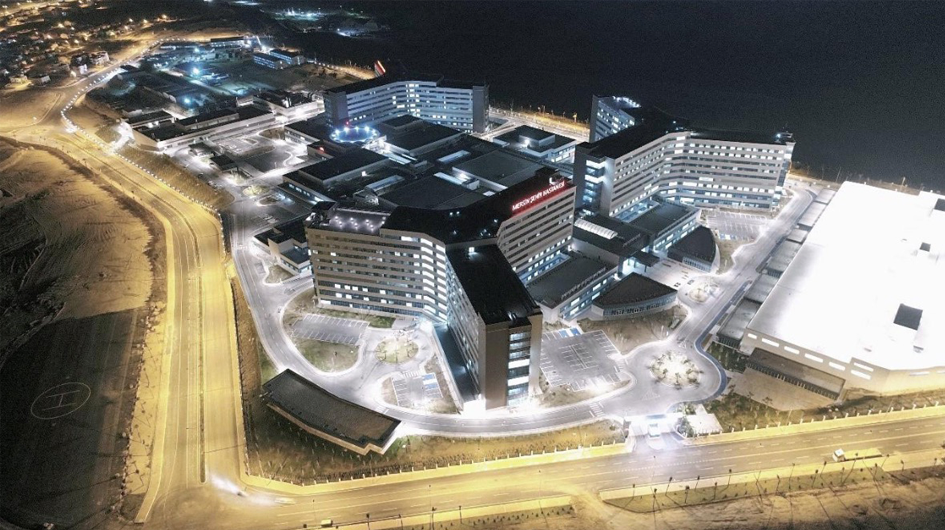KDB Infra invests $60 mn in Turkey’s hospital PPP debt
Jan 19, 2018 (Gmt+09:00)
LG Chem to sell water filter business to Glenwood PE for $692 million


Kyobo Life poised to buy Japan’s SBI Group-owned savings bank


KT&G eyes overseas M&A after rejecting activist fund's offer


StockX in merger talks with Naver’s online reseller Kream


Mirae Asset to be named Korea Post’s core real estate fund operator


KDB Infrastructure Investment Asset Management Co. Ltd. (KIAMCO) has invested 65 billion won ($61 million) in a debt on one of Turkey’s largest hospital public private partnership (PPP) projects for South Korean institutional investors, diversifying into emerging markets for higher yields.
It was KIAMCO’s second investment in Turkey’s healthcare campus PPPs in less than a year, as South Korean investors are seeking to make additional investments in Turkey’s healthcare facility PPPs worth around $10 billion.

The unit of state-run Korea Development Bank (KDB) has recently acquired the debt secured on the Mersin Integrated Health Campus in south Turkey from an unidentified lender, according to sources of KIAMCO and investment firms on Jan. 17.
An investment vehicle for the debt purchase, launched by KIAMCO, is expected to deliver annual returns of 8 to 9% for about 12 years. The debt will expire in 23 years.
The expected returns are 3 to 4% points above those from infrastructure facilities in developed countries, with Turkey’s sovereign debt rated as junk by three global ratings agencies since a failed coup attempt in 2016.
Despite the Turkish government’s repayment guarantee, KIAMCO took out political risk insurances of the Multilateral Investment Guarantee Agency (MIGA), part of the World Bank Group, and AON, a global reinsurer, in case the government fails to carry out the contract and foreign exchange controls.
“Major global investors had participated in initial investments (in Turkey’s hospital PPPs). This investment will serve as a springboard for domestic investors seeking to make an additional investment in 20-odd projects worth around $10 billion,” said one of the sources.
The majority of the South Korean investors in the KIAMCO vehicle are insurance companies aiming to lengthen asset durations.
The sources did not specify which type of debt KIAMCO acquired. But InfraPartners Management(IPM) LLP, which advised KIAMCO for the investment, said in December that senior debt financing for the hospital construction was provided by a club of domestic and international banks.
According to IPM’s news release last month, it has acquired shares and the entire outstanding balance of the shareholder loan in the holding company of the Mersin Integrated Health Campus in cooperation with KIAMCO for a total of €47 million ($58 million).
In 2013, Turkey embarked on a $11 billion program to build 34 new healthcare campuses financed by private investors in one of the biggest healthcare PPPs in Europe.
The construction of three healthcare PPPs has been completed, with another 10-odd projects currently raising private financing.
Multilateral development banks such as European Bank for Reconstruction and Development and European Investment Bank have provided debt financing for healthcare PPP projects in Turkey. Construction firms from Europe and Turkey have made equity investments.
A number of Japanese banks, including Japan Bank for International Cooperation, the Bank for Tokyo-Mitsubishi UFJ and Sumitomo Mitsui Banking Corp., are also among the key lenders.
The Mersin Integrated Health Campus was built in January 2017 to become the first healthcare facility using PPP finance in Turkey, and one of the largest healthcare complexes in the country. It comprises three hospital blocks with a floor space of 374,000 square meters and a bed count of 1,300.
In June 2017, KIAMCO made an 85 billion won equity investment in Turkey’s Gaziantep Healthcare project for two of its investment funds in South Korea, according to the sources and IPM.
MIGA also provided political risk insurance for the equity investment.
By Daehun Kim
daepun@hankyung.com
Yeonhee Kim edited this article
-
 Real estateMirae Asset to be named Korea Post’s core real estate fund operator
Real estateMirae Asset to be named Korea Post’s core real estate fund operatorApr 29, 2025 (Gmt+09:00)
-
 Asset managementMirae Asset bets on China as Korean investors’ US focus draws concern
Asset managementMirae Asset bets on China as Korean investors’ US focus draws concernApr 27, 2025 (Gmt+09:00)
-
 Alternative investmentsMeritz backs half of ex-manager’s $210 mn hedge fund
Alternative investmentsMeritz backs half of ex-manager’s $210 mn hedge fundApr 23, 2025 (Gmt+09:00)
-
 Real estateRitz-Carlton to return to Seoul, tapped by IGIS Asset for landmark project
Real estateRitz-Carlton to return to Seoul, tapped by IGIS Asset for landmark projectApr 22, 2025 (Gmt+09:00)
-
 Real estateS.Korean gaming giant Netmarble eyes headquarters building sale
Real estateS.Korean gaming giant Netmarble eyes headquarters building saleApr 18, 2025 (Gmt+09:00)


